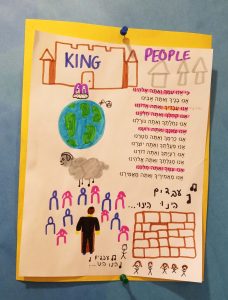
Rabbi Eric Grossman, Head of School
Yom Kippur is a day of judgment, but it is also a day of love. In the time of the Mishna (c. 200 C.E.), Yom Kippur was a day of courtship, when the young maidens of Jerusalem would dance in white robes in the vineyards, looking for a young man with whom to fall in love. It is difficult to reconcile this image of Yom Kippur with the solemn one we know from synagogue today, and yet they have in common that Yom Kippur is the day when God shows his love for Israel by absolving us of our sins.
The Song of Songs is a biblical book of love poetry that our rabbis interpreted allegorically as speaking of the love between God and the Jewish people. In chapter 2, verse 16 we read, “Dodi li, va’ani lo—my beloved is mine, and I am his.” Following the allegorical interpretation, our sages interpreted this to mean that we are God’s people, and He is our deity. They then went on to list many other loving relationships between God and the Jewish people, which were later written as a poem by an anonymous author:
For we are Your people, and You are our God
We are Your children, and You are our Parent
We are Your servants, and You are our Master
We are Your congregation and You are our Leader
We are Your heritage, and You are our Destiny
We are Your flock, and You are our Shepherd
We are Your vineyard, and You are our Watchman
We are Your creatures, and You are our Creator
We are Your faithful and You are our Beloved
We are Your treasure, and You are our Protector
We are Your subjects, and You are our King
We are Your appointed ones, and You are our Appointer

Akiva student artwork
In Hebrew we call this poem by its opening words, ki anu amecha—for we are Your people. In the Ashkenazi tradition, it is recited as part of the Yom Kippur liturgy. At Akiva, we have chosen to highlight this prayer this year and teach it to our students. We selected ki anu amecha because it reflects the three principles of the Akiva School: Pluralism, Individualism, and Creativity. The author has creatively crafted twelve different relationships from one verse, offering a diverse array of approaches to the relationship between God and humans that is in keeping with our commitment to pluralism. Finally, all of our students are encouraged to find the metaphor that speaks most powerfully to them in their relationship with the Almighty.
I pray this Yom Kippur that all members of our Akiva family find love and forgiveness in the eyes of our friends, family and God, and that this year be one of goodness and life for all of Israel.
Click here for the tune for ki anu amecha that our Grade 5 and 6 students learned this year.
G’mar chatimah tovah,











